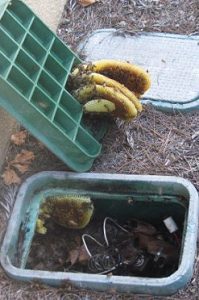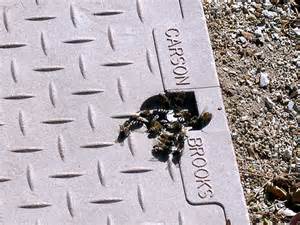Bees building their hives in irrigation valve boxes is a somewhat common occurrence in many places around the world. They like the cool, dry, safe nature inside the box. Unfortunately, this can be dangerous for the staff when they forget to check before opening. Always check the valve box by tapping the top first to ensure the box is not inhabited prior to opening.
Bees can be dangerous to golfers and others nearby as well when they begin to swarm. In some areas such as Florida and the coastal plains of Georgia, Alabama, Mississippi, and Louisiana some bees have become Africanized making them more aggressive and dangerous. Africanized honey bee colonies produce 4 to 8 swarms per year compared to the 1 or occasionally 2 produced by European colonies.

So how do we get rid of them?
There are many different types of products available to eradicate a bee’s nest colony. However, live bee removal and relocation help the environment. A beekeeper will remove an established colony and relocate the colony to a suitable location, by carefully removing the hive by hand, and thoroughly cleaning the area to ensure that no honey residue or hive structure is left behind. He will then relocate the bees to give them a place to live where they can thrive. By doing so not only will the bees not return to the same location, the colony is preserved and the bees are able to continue their work.


Preventing them from finding your irrigation valve box as an attractive new home is the best method. Prohibiting access to the irrigation boxes by filling the lock hole where they enter and exit with expandable foam sealant such as GREAT STUFF ™ Insulating Foam Sealant can help. Seal all the boxes and make sure your irrigation technician keeps a can handy so it can be replaced each time the box is opened. A small amount will fill the hole and force the bees to find a home elsewhere.
Acknowledgments:
“Keeping Africanized Honey Bees Out of Wildlife Nest Boxes” – William H. Kern, Jr. and Caroline Efstation – the University of Florida – IFAS
“Bees, Bees In The Water Meter Boxes” – Lehigh Acres Gazette



